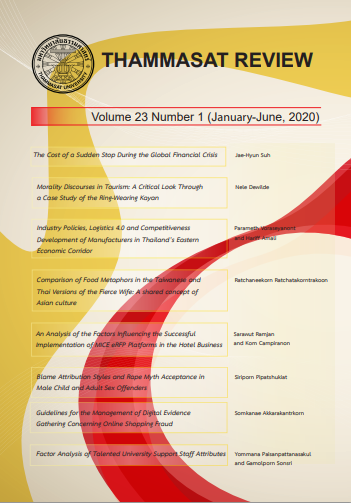Guidelines for the Management of Digital Evidence Gathering Concerning Online Shopping Fraud
Keywords:
Online Shopping Fraud, Digital Evidence, Buyer & Seller Fraud, Computer Crime Act B.E. 2550, Technology Crime Suppression DivisionAbstract
Constant connectivity to the Internet has improved our quality of life by leaps and bounds. Convenience shopping is the ultimate game-changer which is fast becoming the norm. While globalization of the Internet is rapidly moving forward, online businesses and consumers are vulnerable towards online fraud due to increasing usage on online transactions. This mixed methods study aims to investigate the factors that contribute towards online purchases while gathering evidence to develop guidelines for collecting digital evidence. Quantitative samples from 95 police officers from the Technology Crime Suppression Division, whereas qualitative samples comprised of 6 police officers from the same division, and 13 senior executives in various agencies who had been coordinated work with the Public and State Agencies in coordinating work in digital data evidence collection. The study employed focus group discussion and in-depth interviews. Questionnaires, percentage, mean, standard deviation, t-test and ANOVA were also used for data collection and analysis.
Research outcomes revealed that online shopping fraud was done in 3 ways: 1) buyer fraud 2) seller fraud 3) buyer and seller fraud. The Computer Crime Act B.E. 2550 (2007) empowered the police to request information from the service providers regarding the communication, financial, shipping and delivery trail. Problems and obstacles were related to poor knowledge management, delays, late delivery of evidence, scope of police power, incompetent personnel without ability to manage the flow of internal and external knowledge effectively, including a lack of public awareness. The main contribution of this study is to build public awareness to prevent and reduce the risk of online shopping fraud as well as providing a guideline for the Technology Crime Suppression Division to further operations.
Downloads
Published
How to Cite
Issue
Section
License
The opinions and ideas expressed in all submissions published in Thammasat Review are solely that of the author(s) and do not necessarily reflect that of the editors or the editorial board.
The copyright of all articles including all written content and illustrations belong to Thammasat Review. Any individuals or organisation wishing to publish, reproduce and distribute a particular manuscript must seek permission from the journal first.








